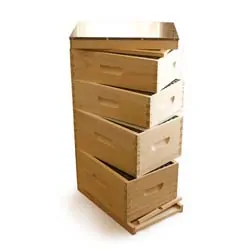In this edition of Beekeeper Stories, we focus on one of our own! Nicole is a key part of the PerfectBee Team and, as you can read below, has a lot to say about how she found beekeeping, both professionally and in her bee yard.
Nicole’s love for beekeeping began when she took a job in the industry, thinking that having honeybees would be just like taking care of her chickens or other livestock… but boy, was she wrong! The more she discovered about bees and beekeeping, the more interested she became, building an ongoing curiosity which is now a key part of her life.

Nicole’s love of beekeeping began in 2019, when she took a new job working for a beekeeping supply manufacturer. But that interest soon grew far beyond her job. She moved to PerfectBee in 2023 and now has the opportunity to create and co-ordinate articles – and her love of bees continues to grow. Win, win!
Nicole keeps bees on her 5-acre property in the beautiful (but quite small) town of Argyle, NY. Her awesome husband Rob and stepdaughter Rhiannon enjoy helping out in the bee yard, too, but her stepson Bobby isn’t quite as excited about bees (yet).
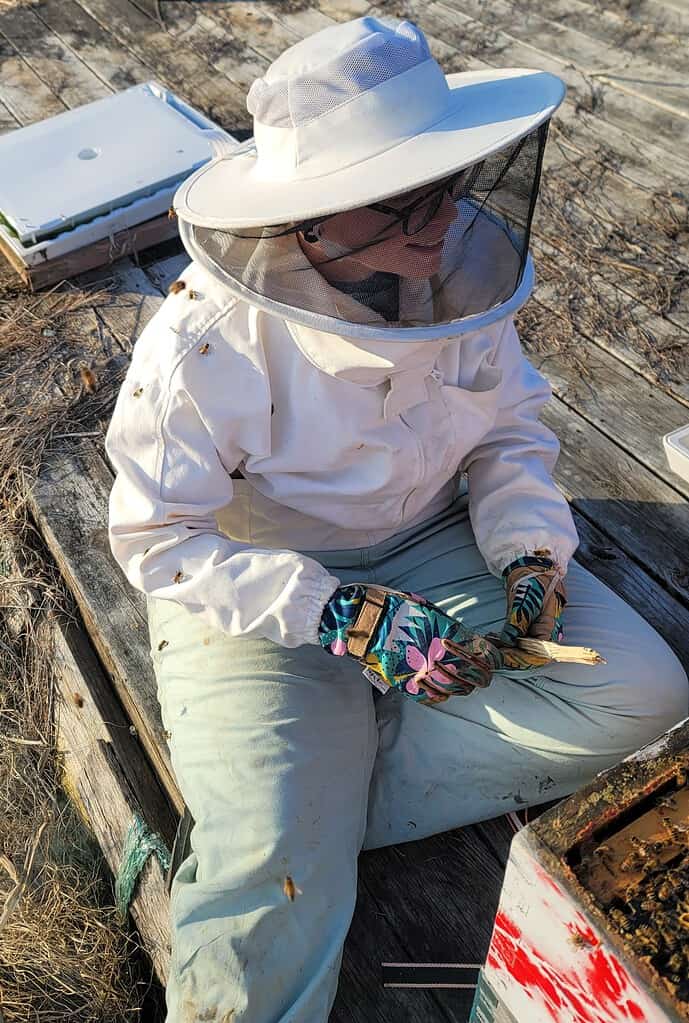
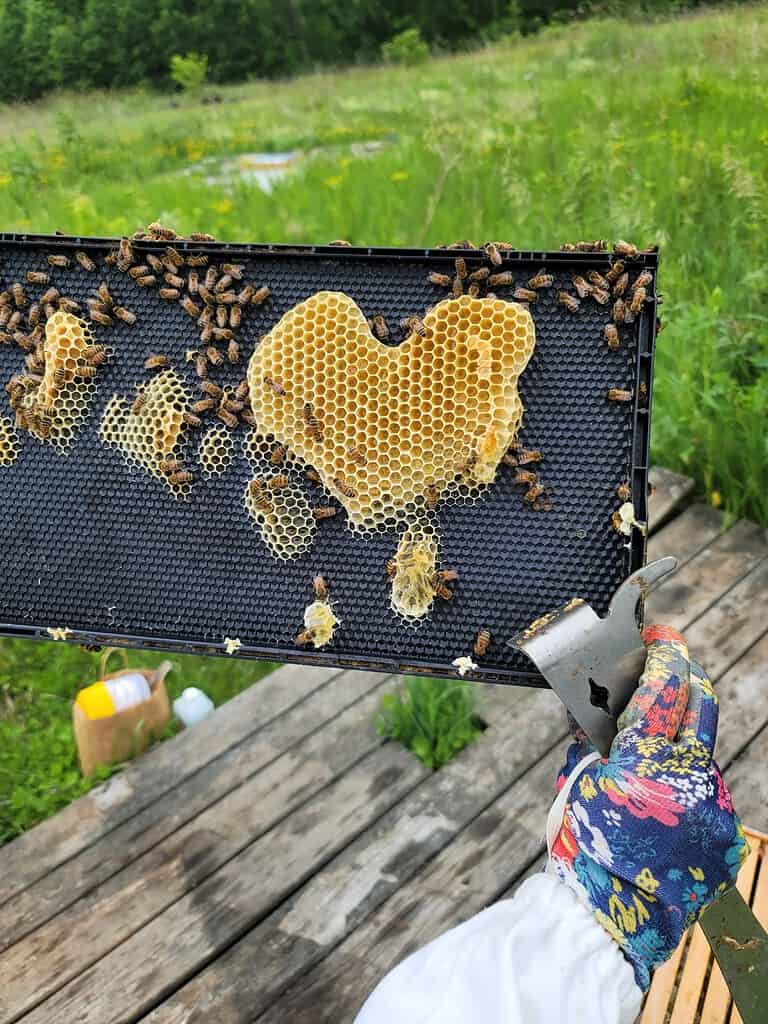
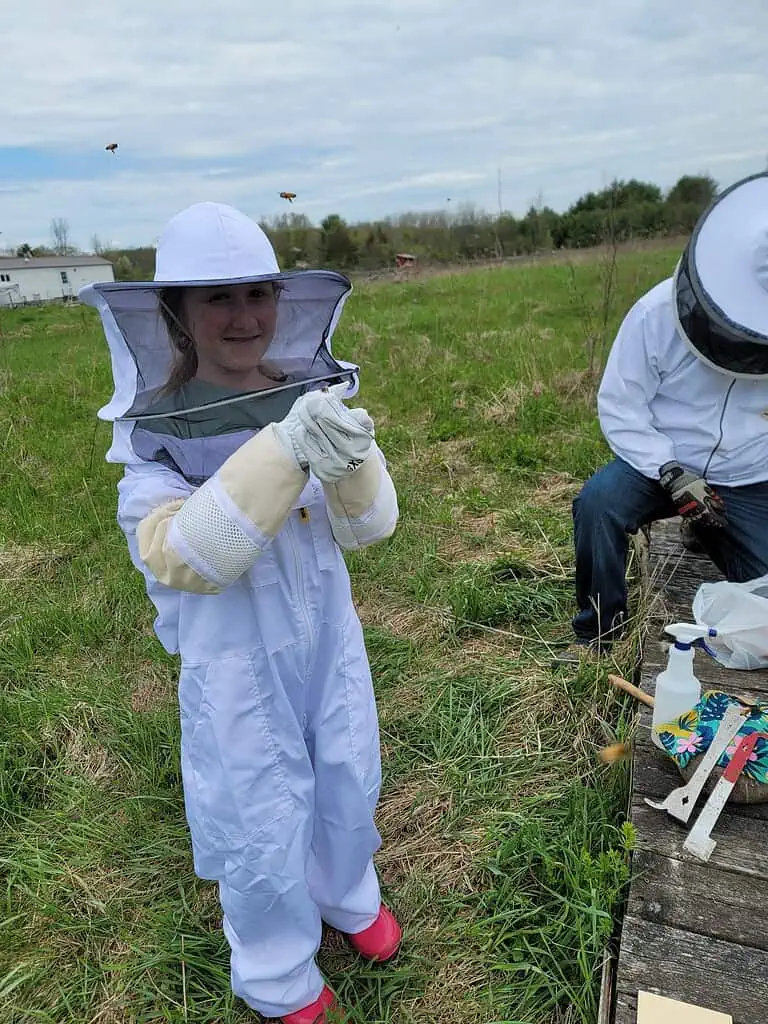
Right now, Nicole uses 10-frame Langstroth wooden hives but hopes to invest in some Lyson polystyrene hives someday, to help her bees in the cold winters of Upstate NY.
She brought home her first nucleus colony in 2020 and, though she only started with one colony that year (which she regrets, she wishes she started with 2!), she does have two colonies currently.
We asked Nicole some about the many reasons that she finds honeybees and beekeeping so interesting.
Q: What are your main objectives and goals with beekeeping?
I’ll be honest, I didn’t have much of an interest in beekeeping specifically before I had to learn more for a new job. Once I learned about the complexity of honeybees and their tiny (yet immense) lives and their impact on the world and the food we eat….well, I just couldn’t stop learning more.
I’ve always had a great love for animals and have had many pets. So I initially thought that having bees would be like some of those other pets. It can’t be harder than lugging 50lb of hay to your cows at 5 am, right?
Well, not so much.
Once I got “stung” by beekeeping (editorial note: Nicole is the team pun-maker!), my main goal has always been to learn and understand their fascinating lives. I find that beekeeping can bring me a sense of overwhelming peace and joy to me, in many ways. It’s not an easy hobby, but the zen-like state I experience through the hum of my bees, as I sit next to their hive or while completing a hive inspection, is not something I have found in other hobbies or activities.
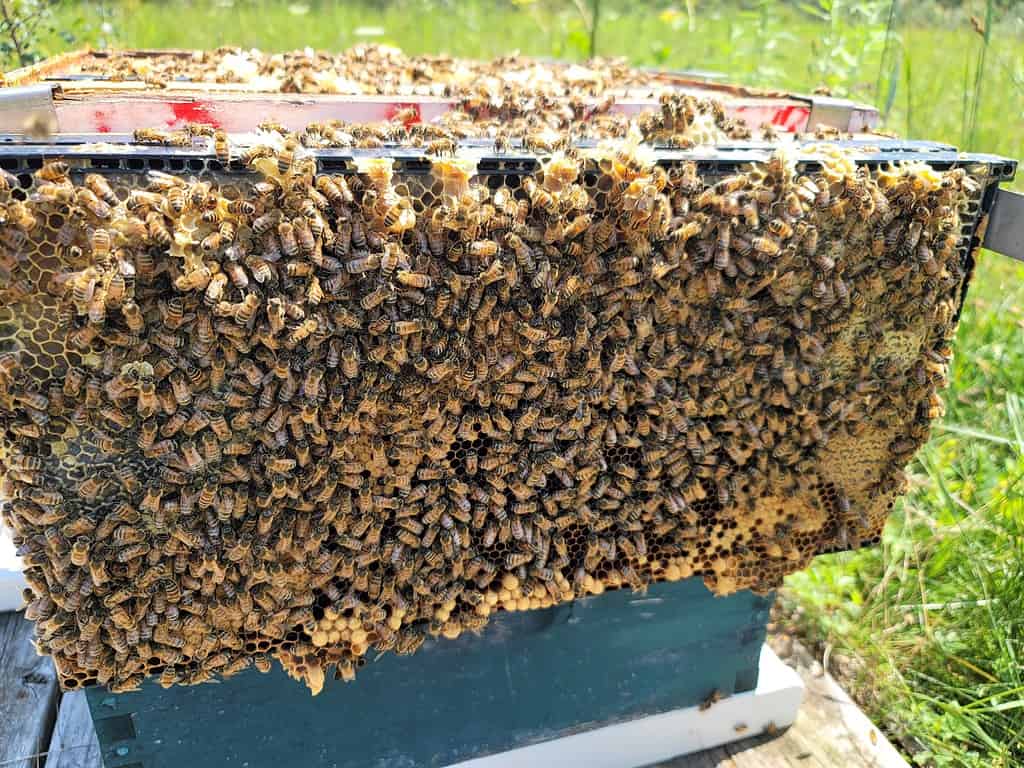
Q: What do you enjoy most about beekeeping?
Though I do enjoy the honey our bees share with us, (not the extraction part though – ugh, too sticky for me!), I focus more on the joy of watching such complex creatures thrive. I know that if I can learn as much as possible to care for my bees as best as possible, they will in turn add positive things to the environment around us, too.
Because of the way honeybees impact our environment and vice-versa, I have always appreciated how my love for beekeeping has expanded my knowledge about so many other things, too. I’ve always had an interest in gardening and flowers, but by becoming a beekeeper, that interest had a very specific purpose.
I find myself keeping track of things in my area and environment that I wouldn’t have noticed before keeping bees. Having honeybees and learning to understand them has made it much easier for me to see how so many things in nature connect to and impact each other.
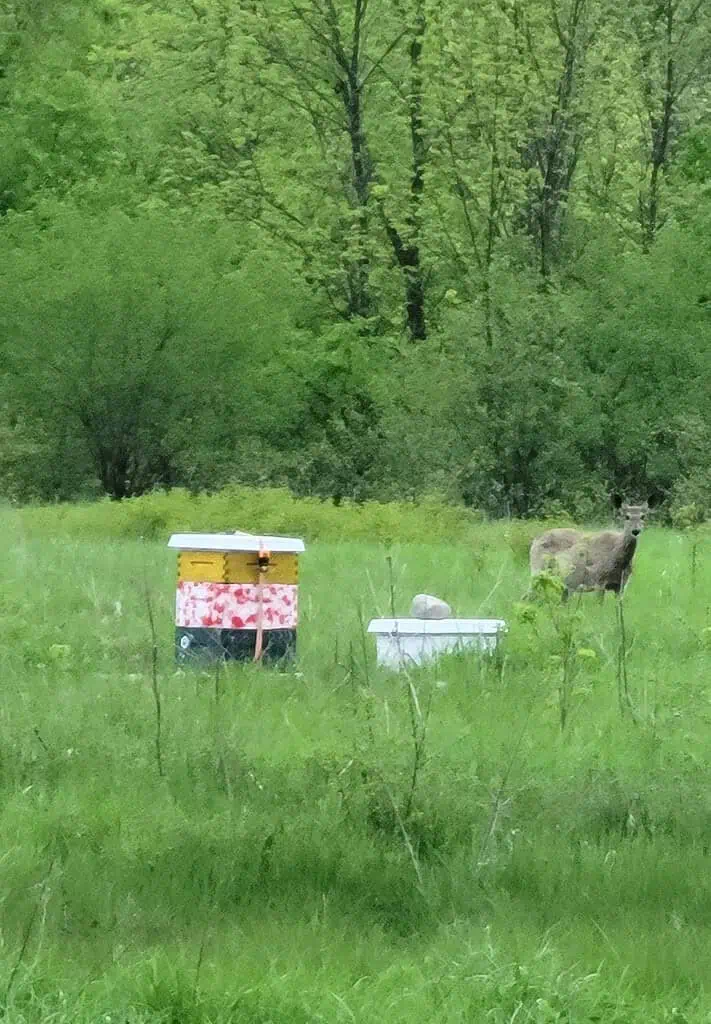
I love learning about beekeeping and honeybees, but also feel very passionate about helping others to learn as much as possible. I am so grateful that I get to do that through my role at PerfectBee. Every day is another adventure when you’re learning and writing about beekeeping!
Q: Does the climate in Upstate NY influence your beekeeping style or equipment?
Well, yes and no. I look at this in more detail in our recent Q&A “Do my beehives need added insulation?” but being in a cold climate has certainly impacted some of my beekeeping decisions. I live in an area where it can get pretty cold, into the negatives at times. So I add some additional polystyrene hive components to my hives (an insulated inner and outer cover) to help my bees not have to work so hard to keep their hive warm.
I also make sure to ratchet strap my hives together, though I should probably consider if it’s worth investing in an electric fence! I always heard there weren’t any bears in my area, but one was spotted this year and I’m a bit concerned. Strapping the hives together AND strapping them down to the wooden platform they’re on should hopefully help keep them safe, for now!
I have successfully overwintered a few hives that were quite strong ahead of the winter months without the need for added insulation (like a hive wrap). But I may need to consider investing in some of those, too, if it keeps being as cold as it’s been here! I will often feed my hives heavy sugar syrup in the fall, to help them build up enough resources. Thankfully I have never had colonies suffer from starvation, though I harvest very little honey.
Q: Are you a member of a beekeeping club?
Though I’m not a member of a local beekeeping club, I am very glad to be a part of the PerfectBee Colony community! I love the support I receive from our more experienced members. Colony offers many ways to get insights from other beekeepers, whether it’s through the help of our PerfectBee Ambassadors, on the Colony Forum or during our Colony Cluster events, or by connecting with one of the beekeeping members I’ve met through Colony.
There’s a lot to learn when it comes to beekeeping, so knowing there’s a community to support my concerns makes it much less scary.
Q: What is your biggest concern about your bees or beekeeping?
I have some health issues that sometimes make it difficult to lift the heavy equipment used in beekeeping or complete the tasks I’d like to do on time. I’m very lucky to have a husband who is more physically capable and is willing (and happy) to help with the beekeeping chores. But I still worry that my health will hold me back from getting as much done in the bee yard as I’d like.
Q: Any technique recommendations for someone with mobility issues?
Absolutely – learn from my mistakes!
You can move heavy boxes without lifting the entire box! I dropped a whole deep box that was VERY heavy, because I was rushing and anxious after getting stung. Luckily, both the bees and I were fine. But it could have been a much different story.
I now know that instead of picking up and moving a whole box, with frames inside, from the top of the hive, I can bring an empty hive body with me to transfer the frames instead. Once you’ve inspected that box, simply replace the empty hive body and move the frames back one-by-one (being careful to keep them in the same position)!
Q: What is or was your biggest surprise in beekeeping?
The way that my passion for learning about honeybees really expanded my knowledge about a TON of things, especially the environment around me. For instance, because I have honeybees, I now know when certain flowers should be in bloom in my area and what it means for the bees. I also now insist on never mowing my lawn and though it looks messy, it makes for very happy bees!
Q: Do you plant anything specific for your bees?
I try to plant and support native wildflowers and plants in my yard, especially the dandelions and early spring blooming trees. I have maintained a vegetable garden for a few years too and am happy to report that it has been much more successful since having honeybees here.
I always try to choose native plant species that will bloom at various points throughout the year and provide a good source of nectar, pollen, or both to my colonies.
Q: Can you recall a time when you felt nervous in the bee yard?
Absolutely! My “scariest” beekeeping experience wasn’t when I dropped the box, but was actually marking a queen for the first time!
I went out to the hive just to do an inspection but brought my queen marking pen and cage with me just in case. I had no plan to find and mark the queen as I had NO luck finding a queen in any of my hives so far (this was my 2nd year of beekeeping). But there she was anyway!
My heart was absolutely pounding as I tried to get her underneath the push-in queen marking cage. I was SO scared I’d hurt her… I’ve never been so scared in my life, I don’t think!
I did squish her a little bit too much and her legs and body were flailing around, but ultimately was able to mark her without issue.
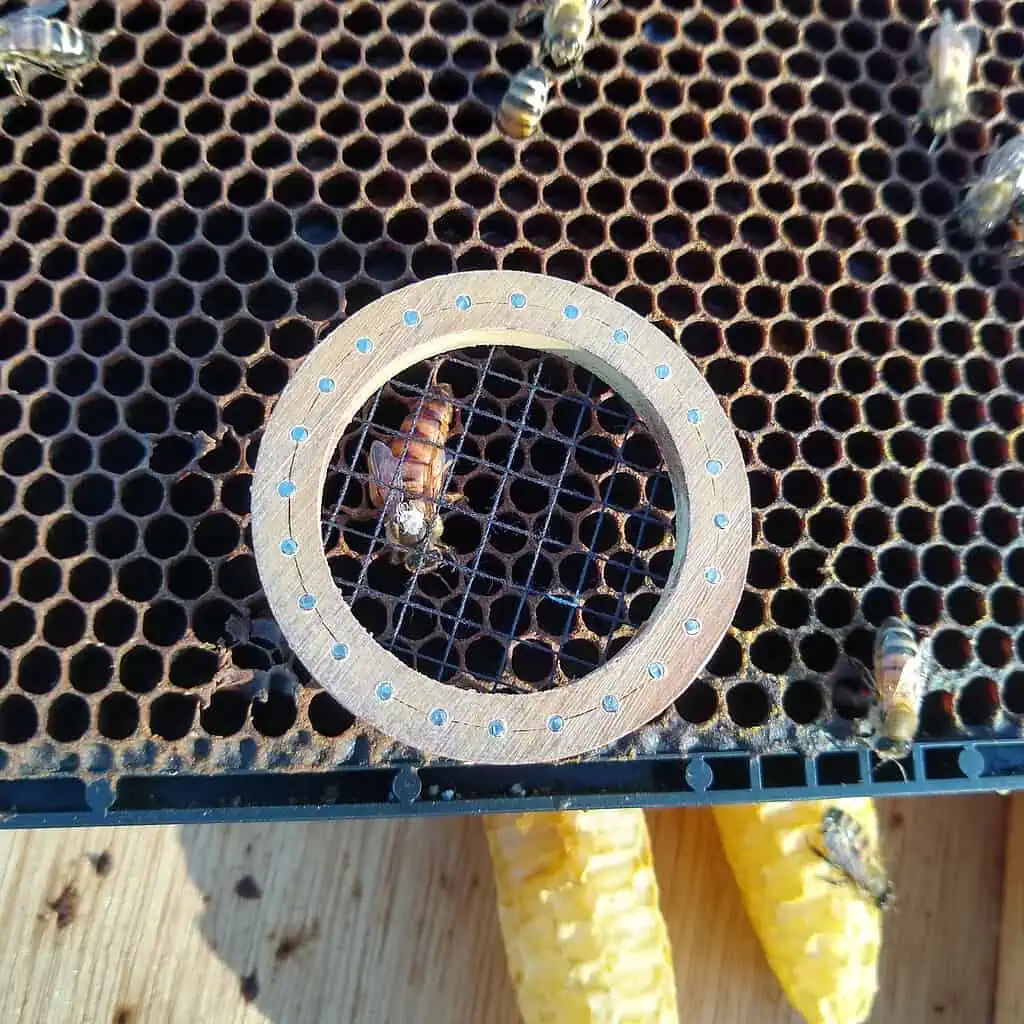
Q: What are the benefits of marking your queen? Was it worth it?
A: There are plenty of benefits to marking a queen, but in my case, I wanted to have an idea of when the queen had been born, and marking her with the right color for that year solved that problem. Adding a spot of marking paint to your queen can also make her much easier to find when you’re completing an inspection, too.
Though it was scary to do for the first time, it was absolutely worth it! Now, if I ever want to mark a queen again, it won’t be nearly as scary as I thought it was the first time.
Q: Is there something about the manufacturing of beekeeping supplies that may surprise the average beekeeper?
Having worked for a number of years at a beekeeping manufacturer, there were quite a few things that blew my mind when it came to the manufacture and warehousing of beekeeping supplies, especially JUST HOW MANY different products there really are for beekeepers. But the most surprising and interesting part of the manufacturing process, to me, is how exact all the measurements and dimensions of everything must be to work for honeybees.
Many beekeepers learn early about the importance of “bee space”. When it comes to building and assembling manmade boxes for honeybees to live in, it’s more important than ever! It seemed to me at first like manufacturing these boxes wouldn’t be too difficult, but there are actually a LOT of tiny things to keep in mind. There are several different machines used to build various parts of beekeeping equipment, and they must all be designed and aligned perfectly to have the right dimensions to be able to fit together tightly.
In addition to the actual manufacturing process being so complex, because of the dimensions, the quality of the product is equally important. I was surprised to learn how much goes into the process of buying the raw lumber and converting it into woodenware, while trying to keep quality high but costs low.
Even though my passion is more around helping people learn to care for their bees and writing content about honeybees, I am still so thankful for my time spent learning about the manufacture of beekeeping supplies. It helped me to better understand not just what the bees need, but what beekeepers need, too.
Q: Do you have any tips or tricks for new beekeepers getting started in this fascinating hobby?
The number one thing I recommend to all new beekeepers is to TAKE NOTES and keep good records. Whether you want to use an in-hive monitor that sends data to your phone, a logbook to write down what you saw, or a photo/video journal of each hive inspection, knowing what’s happening inside your beehives and when can make a HUGE difference in having a successful season. Getting into the habit of taking notes and making an integrated pest management plan EARLY in the season can be a huge help.
In addition to taking good notes and keeping track of your hive records, try to give yourself some grace, too. Beekeeping isn’t a ‘black and white’ type of hobby. Many beekeepers, especially those who’ve been doing it a while, can sometimes make new beekeepers feel a little bad if they don’t agree or want to keep their bees the same exact way. Take all input with a pinch of salt and put it in the broader context.
But there are really no rules or a right-or-wrong way to keep bees. To me, it’s more about figuring out what bees need by building a foundation of knowledge and understanding about their lives overall. Then you can use that knowledge to figure out what works best for YOU to help them get and stay healthy.
Don’t get discouraged by others who make you feel like you aren’t doing things perfectly right. Instead take the time to understand the science and lives of bees and adjust accordingly. And don’t forget that there will always be kind and supportive beekeepers within Colony who will be glad to help you to understand what’s best for your bees…and not to make you feel bad.
